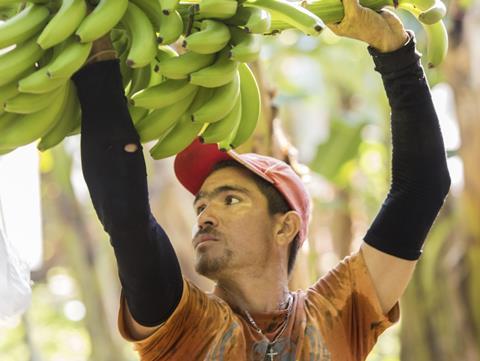Latin American, African and Caribbean industries repeat calls for action ahead of next week’s World Banana Forum
The leading banana associations of Latin America, Africa and the Caribbean have called for European retailers to simplify certification schemes and stop dragging their feet when it comes to implementing a fairer banana pricing policy.

In a statement issued ahead of next week’s Global Conference of the World Banana Forum (WBF) in Rome, they said that despite over-certification, higher production costs, the increased risk of disease and growing insecurity making life increasingly difficult for producers, retailers are “opting for purchasing policies that are inconsistent with sustainability”.
Banana-producing countries believe the retailers are deliberately stalling on price reform by failing to agree on which methodology should be used to calculate prices. by. They have repeatedly called for supermarkets to adopt the price calculation methodology and procedures established by Fair Trade. They also argue that the supermarkets should recognise the existing labour obligations and audit processes of each producing country.
“To date, Aldi Süd and Sainsbury have made public commitments to use Fairtrade prices and/or costs calculations to guide their purchasing practices, but a majority of retailers remain passive and reluctant in adopting sustainable practices,” the statement said.
On living wages, the banana producing countries noted that organisations such as GIZ and IDH are seeking “to establish mechanisms to achieve and verify compliance with the living wage, parallel to those already existing in the countries according to their rules, thereby generating additional costs for producers and overlooking regulations, local practices and the official powers of national authorities”.
Ahead of next week’s forum, they are calling for retailers to adopt Fairtrade methodology to calculate a fair price that considers environmental sustainability efforts and fair wages.
They also want retailers to respect the rules and regulations of banana-producing countries, “recognising that the mechanisms to achieve the living wage in each country may vary, and that this objective can be achieved through public policies, collective bargaining or other valid processes established in the countries’ Constitution and national law”.
They want a permanent committee to be set up within the WBF, in which retailers, producers and exporters can work towards the rationalisation and harmonisation of methodologies and certifications in order to ease the administrative and economic burdens for banana producers.
The associations of producers and exporters of banana to the European market, represent the following countries: Ecuador, Colombia, Guatemala, Dominican Republic, Peru, Côte d’Ivoire, Cameroon, and Ghana.



